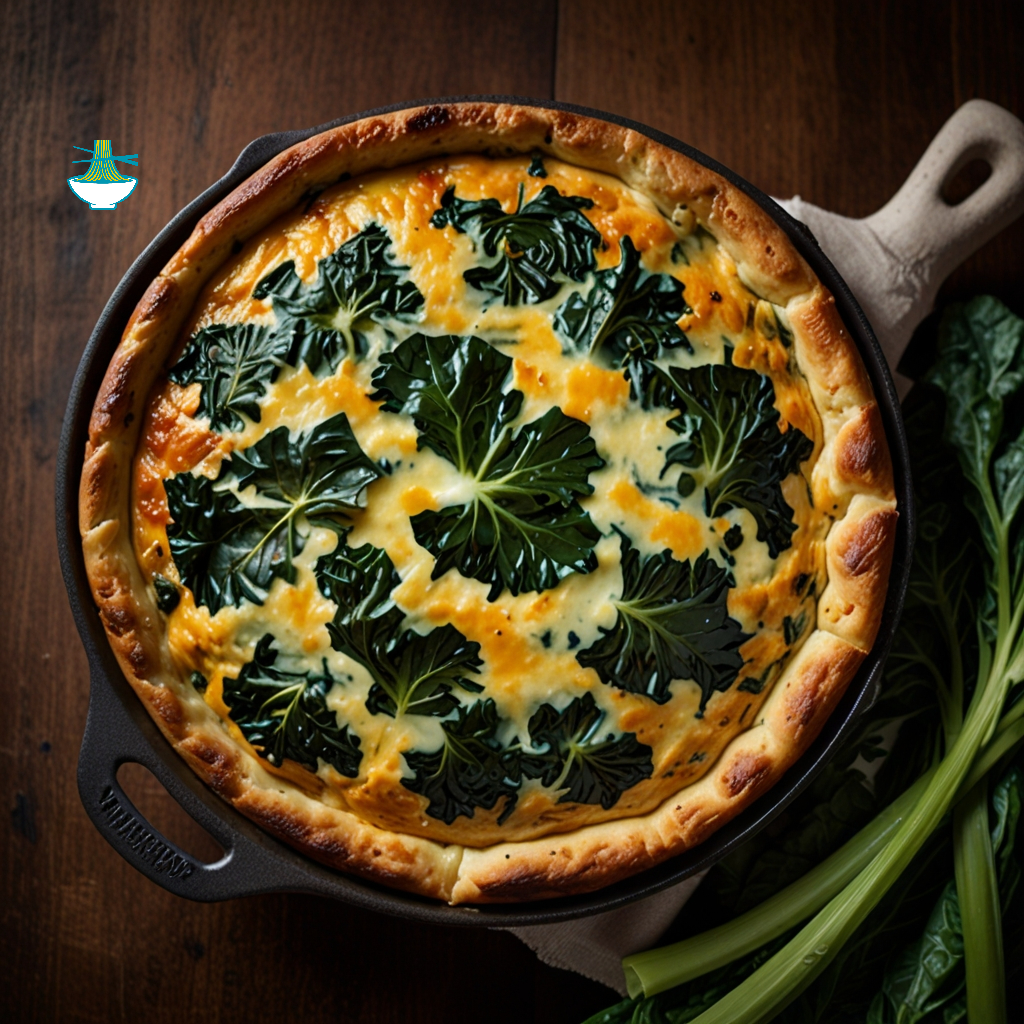Swiss chard frittata stands out as an exceptional option for individuals undergoing cancer treatment. Bursting with essential vitamins, minerals, and antioxidants, this dish serves as a powerhouse of nutrition. Swiss chard itself is rich in vitamins A, C, and K, along with minerals like magnesium, potassium, and iron, all of which are vital for maintaining overall health, particularly during cancer therapy.
Overall, Swiss chard frittata stands as a beacon of nutrition and flavor, offering much-needed support and sustenance to individuals navigating the challenges of cancer treatment.
Ingredients:
- 8 large eggs
- 1 bunch Swiss chard, washed and chopped
- 1 small onion, diced
- 2 cloves garlic, minced
- 1 tablespoon olive oil
- Salt and pepper to taste
Washing vegetables in a safe way for cancer patients
1. Wash vegetables with cold water.
2. Use one tablespoon of apple cider vinegar per liter of water.
3. Gently scrub the vegetables.
4. Rinse them with clean water.
This method effectively removes harmful substances more quickly, making the vegetables safer for consumption.
Instructions:
1. Preheat your oven to 350°F (175°C).
2. In a large skillet, heat the olive oil over medium heat. Add the diced onion and minced garlic, sautéing until softened and fragrant, about 2-3 minutes.
3. Add the chopped Swiss chard to the skillet and cook until wilted, about 5-7 minutes. Season with salt and pepper to taste.
4. In a separate bowl, beat the eggs until well mixed. Season with salt and pepper.
5. Pour the beaten eggs over the cooked Swiss chard mixture in the skillet. Gently stir to combine, ensuring the eggs cover the vegetables evenly.
6. Allow the frittata to cook on the stovetop for a few minutes until the edges start to set.
7. Transfer the skillet to the preheated oven and bake for 15-20 minutes, or until the eggs are fully set and the top is lightly golden brown.
8. Once done, remove the frittata from the oven and let it cool for a few minutes before slicing and serving.
This Swiss chard frittata can be enjoyed warm or at room temperature, making it a convenient option for busy mornings or as a side dish for lunch or dinner. Plus, it provides a good dose of vitamins and minerals essential for supporting the body during cancer treatment.
Note:
If using cheese, sprinkle it evenly over the top of the frittata.
Research suggests cancer patients should avoid processed foods.
Nutrition Value:
1. 8 large eggs:
- Calories: Approximately 560 calories.
- Carbohydrates: Minimal, about 4 grams.
- Protein: Rich source, providing around 48 grams.
- Fat: Each egg contains about 40 grams of fat, including healthy fats like omega-3 fatty acids.
- Sodium: Contains a moderate amount, approximately 560 mg.
- Cholesterol: Each egg has around 186 mg of cholesterol, which can be a concern if consumed in excess but can fit within a balanced diet.
- Vitamins: Excellent source of vitamins B12, D, and riboflavin (B2).
- Minerals: Rich in selenium and phosphorus, which are essential for various bodily functions.
- Nutritional Benefit: Eggs provide high-quality protein and essential nutrients, supporting muscle maintenance and repair, immune function, and overall health during cancer treatment.
2. 1 bunch Swiss chard, washed and chopped:
- Calories: Approximately 35 calories per cup.
- Carbohydrates: Low, about 7 grams per cup.
- Protein: Provides a small amount, around 3 grams per cup.
- Fat: Negligible, less than 1 gram per cup.
- Sodium: Low, with about 300 mg per cup.
- Cholesterol: None.
- Vitamins: High in vitamins A, C, and K, as well as folate and various B vitamins.
- Minerals: Good source of magnesium, potassium, and iron.
- Nutritional Benefit: Swiss chard is rich in antioxidants, vitamins, and minerals, which can support immune function and help reduce inflammation associated with cancer.
3. 1 small onion, diced:
- Calories: About 20 calories per small onion.
- Carbohydrates: Provides around 5 grams per onion.
- Protein: Minimal, less than 1 gram per onion.
- Fat: Negligible.
- Sodium: Low, with approximately 2 mg per onion.
- Cholesterol: None.
- Vitamins: Good source of vitamin C, B6, and folate.
- Minerals: Contains small amounts of potassium and manganese.
- Nutritional Benefit: Onions contain flavonoids and sulfur compounds with potential anticancer properties, as well as vitamins and minerals that support overall health.
4. 2 cloves garlic, minced:
- Calories: Approximately 10 calories per clove.
- Carbohydrates: Low, about 2 grams per clove.
- Protein: Negligible.
- Fat: Minimal, less than 1 gram per clove.
- Sodium: Very low, around 1 mg per clove.
- Cholesterol: None.
- Vitamins: Contains vitamin C, B6, and trace amounts of other vitamins.
- Minerals: Provides small amounts of calcium, potassium, and phosphorus.
- Nutritional Benefit: Garlic contains organosulfur compounds with potential anticancer effects and may help boost immune function and reduce inflammation.
5. 1 tablespoon olive oil:
- Calories: About 120 calories per tablespoon.
- Carbohydrates: None.
- Protein: None.
- Fat: Mainly monounsaturated fat, providing around 14 grams.
- Sodium: Negligible.
- Cholesterol: None.
- Vitamins: Contains vitamin E and K.
- Minerals: Rich in antioxidants like polyphenols.
- Nutritional Benefit: Olive oil is a heart-healthy fat that may help reduce inflammation and oxidative stress, both of which are linked to cancer development and progression.
6. Salt and pepper to taste:
- Calories: Negligible.
- Carbohydrates: None.
- Protein: None.
- Fat: None.
- Sodium: Depending on the amount used, may contribute to sodium intake.
- Cholesterol: None.
- Vitamins: None.
- Minerals: None.
- Nutritional Benefit: While salt should be used in moderation, it can enhance the flavor of dishes without adding extra calories. Pepper adds flavor without significant nutritional impact.
Overall, this dish provides a balance of macronutrients, vitamins, and minerals that can support a cancer patient's nutritional needs during treatment. It's rich in protein for muscle maintenance, antioxidants for immune support, and healthy fats for overall health.


Comments